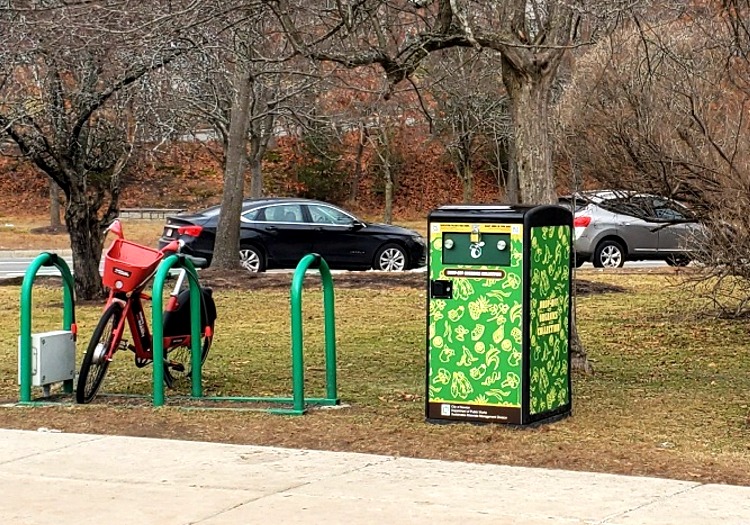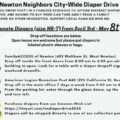Newton continues to move forward in reducing the amount of food waste that goes into the trash. This benefits the environment by reducing greenhouse gas emissions, reducing demand for landfills, and improving soil health. The options for collecting compost include drop-off locations and a curbside pickup service.
Residents have been able to drop-off compostable items — also referred to as organics — for free at the Resource Recovery Center on Rumford Avenue since Fall 2020. The City has recently added new free drop-off locations at Albemarle Field, City Hall, and Wheeler Road across from Oak Hill Middle School. Accepted organics are listed here. “We’re excited to offer this expanded no-cost drop-off option for residents as another way they can get food waste out of the trash,” said Waneta Trabert, director of Newton’s Sustainable Materials Management Division.
In addition, starter kits for the City’s preferred vendor for residential curbside pick-up service, Black Earth Compost, are now free (formerly $39) thanks to earmarked funds from the 2022 Economic Development law that were secured by Senator Cynthia Creem. Currently the Black Earth service costs $59 for every 6 months ($10/month) for weekly pickup. A less expensive bi-weekly pickup option is also available. Over 3,000 Newton households already use the Black Earth service.
While backyard composting is considered one of the most environmentally friendly solutions for organic waste, it is not as convenient for many people, due to lack of time or space. The City continues to provide discounts on backyard composters for any residents who are interested.
Questions residents ask include: Why does the City continue to promote composting? Why should I compost? Won’t a compost collection bin smell and get messy? Can’t I just put food waste down my garbage disposal?
A recent Massachusetts Department of Environmental Protection analysis of residential trash shows that 33% of residential waste consists of compostable materials, including food waste and compostable papers. According to the U.S. EPA’s updated recommendation on food waste management (summarized in this Wasted Food Scale chart), the best way to prevent food waste is to buy only what is needed. After that? Composting. According to the EPA, composting is one of the easiest and least expensive environmental actions one can take. The Wasted Food Scale recommends avoiding incinerating (the fate of Newton’s trash) or sending organics down the drain.
In order to meet climate goals, Massachusetts must reduce food waste, as Janet Domenitz of MASSPIRG and Cindy Luppi of Clean Water Action explain. They also reference the state’s November 2023 Organics Action Plan and the need to more than double the diversion of food waste by 2030 in order to meet the state’s goals.
The U.S. Composting Council provides information on why compost is a valuable resource and a beneficial soil amendment. Benefits include healthier plants, stormwater management, water conservation, and climate change mitigation. Turning organics into compost is a closed-loop cycle going from farm to table and back to farm. Compost can help soil sequester carbon to mitigate the effects of climate change. It also helps soil retain water, reducing flooding and the need for watering.
Some people use a garbage disposal to put organics down the sink. This practice is convenient yet controversial. According to the EPA’s Wasted Food Scale, this is the least desirable method to handle food waste. Garbage disposals use water and electricity (and can cause costly plumbing problems). While the MWRA wastewater treatment plant that handles Newton’s wastewater captures methane for use as an energy source, the full EPA report states that in many systems more methane escapes than is captured, in part during transport in the pipes leading to the plant. The report acknowledges that more study is needed.
And the odor issue? Separating food waste will not generate any more odors in the kitchen than a trash can. It just requires good habits, such as emptying the countertop bin every few days. A survey of Black Earth customers in Newton last year found that an initial barrier to signing up was concern about the smell, but each customer said this turned out to be an unfounded concern. With a closed lid countertop bin, the odors are mitigated. Compostable liners or paper bags can also be used to keep both the countertop collection bucket and the outdoor collection cart clean. Another option is to collect food waste in a compostable bag in the freezer, then take that bag out for the weekly pickup service from Black Earth.
Composting is an easy and inexpensive way to have a significant and positive environmental impact. The City continues to encourage and promote composting because it is good for the health of the earth by reducing greenhouse gas emissions, improving soil health, and reducing waste.
Residents interested in learning more can consult resources cited by Black Earth, the U.S. Composting Council, and Just Zero.
Alan Gordon is a member of Newton’s Sustainable Materials Management Commission and a board member of Green Newton.







